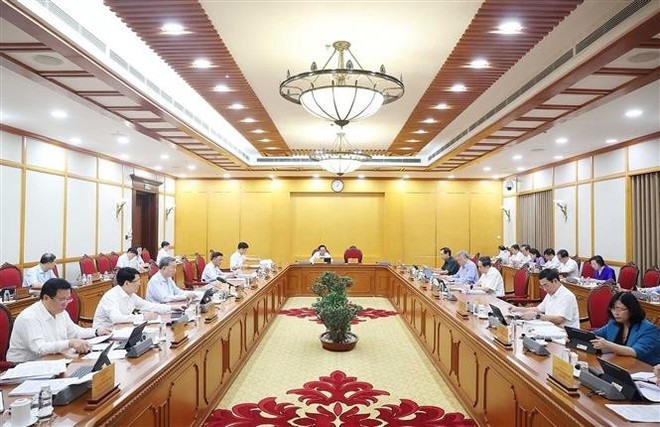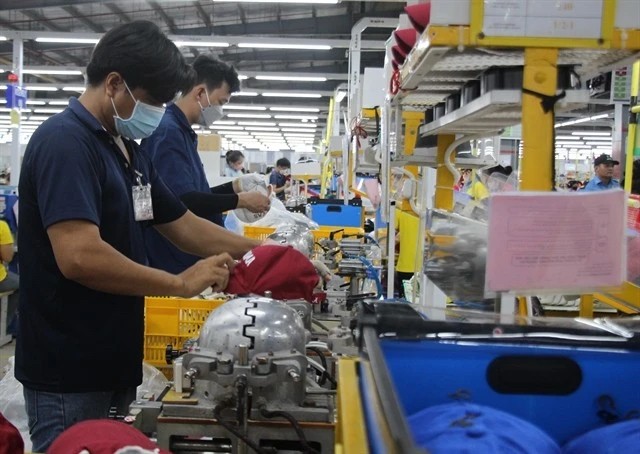Sweden willing to share its experiences of low-carbon circular economy with Vietnam
Sweden has made great progress in its circular economy and “would happily” share its experiences with Vietnam, Swedish Ambassador to Vietnam Ann Måwe has said.
Swedish Ambassador to Vietnam Ann Måwe. Photo: Swedish Embassy
The Embassy of Sweden in Vietnam, Business Sweden, the Ministry of Natural Resources and Environment (MONRE), and the Hanoi People’s Committee on November 12 jointly hosted a workshop on “Promoting a low-carbon circular economy - a Swedish perspective”.
The workshop was attended by hundreds of participants representing senior goverment officials, NGOs, institutes, universities, organizations and enterprises actively involved in circular economy such as Tetra Pak, Food Industry Asia, PRO Vietnam, Swedish Waste Management Association and Circulate Capital.
The event focused on discussions on Vietnam's policies and vision in promoting the circular economy, successful case studies in Sweden and in the region, as well as enterprises’ approach to access capital for implementing this model.
The workshop also featured an important discussion on public – private partnership, which is a key condition for a low-carbon, circular economy model to be expanded in Vietnam.
Rapid growth and industrialization have not been friendly to Vietnam’s environment and natural assets. Waste generation is expected to double in less than 15 years. The country is among the ten countries worldwide that are most effected by air pollution. Meanwhile, less than 10 per cent of waste in Vietnam is recycled and a significant amount of waste ends up directly in landfills or the ocean.
With 13 million tons of waste released into the ocean each year, Vietnam ranks 17th in the world and fifth in Asia for ocean plastic waste pollution, releasing more than 500,000 tons per year. The circular economy is currently a global sustainable trend, and transformation from a conventional economy enables countries to deal with a scarcity of natural resources and high environment pollution.
Addressing the event, Swedish Ambassador Ann Måwe said that "In a circular economy, we see everything as a resource for something else – waste becomes a resource. Circular economy is good for both consumers and businesses. Companies that are moving in this direction have proved that recycling used products can be more cost effective than creating them from scratch. As a result, production costs are reduced, so that the sale price is also lowered, thereby benefiting the consumer. I hope this is inspiring for Vietnamese businesses."
She also stressed, "As one of the most sustainable countries in the world, Sweden is aiming for a zero-waste society. Thanks to the environmental awareness of its citizens, effective policies and incentives by the government and an efficient waste collection system in place, Sweden has made great progress in its ‘recycling revolution’ over the past two decades. The percentage of recycled waste by households has increased from 38 percent in 1975 to 99 percent today. Circular economy in a simple way means reduce, reuse and recycle. This also implies changed patterns of consumption. Sweden would happily share its experiences with Vietnam!".
Recommended
 National
National
Vietnam News Today (Jun. 7): Prime Minister works with Estonian firms to accelerate projects in Vietnam
 National
National
Vietnam News Today (Jun. 6): Foreign Investment in Vietnam Surges in Five Months
 National
National
Vietnam News Today (Jun. 5): PM sets off for attendance at UNOC 3 in France, official visits to Estonia, Sweden
 National
National
Vietnam News Today (Jun. 4): Vietnam - Promising Candidate for Southeast Asia’s Next Powerhouse
Popular article
 National
National
Shangri-La Dialogue 22: Vietnam Highlights Some Issues of Ensuring Stability in a Competitive World
 National
National
Vietnam News Today (Jun. 3): PM Pham Minh Chinh to Attend UN Ocean Conference, Visit Estonia, Sweden
 National
National
Vietnam News Today (Jun. 2): Vietnamese Trade Mission Sounds Out Business Opportunities in United States
 National
National



